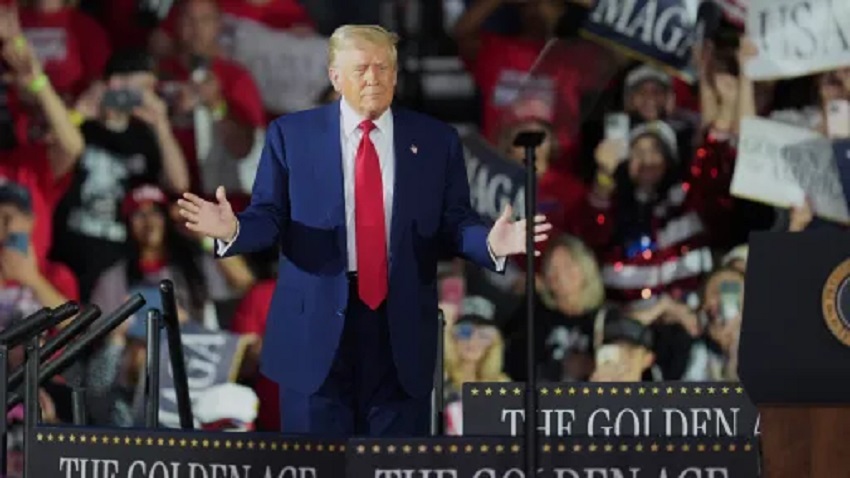Grand Rapids, Mich. — President Donald Trump celebrated the 100th day of his second term Tuesday with a rally in Michigan, where he spent much of the evening defending his policies and revisiting familiar grievances. Despite the milestone, Trump largely stuck to campaign-style rhetoric, focusing on his signature issues and continuing to target his political opponents.
In his 90-minute speech, the President took aim at Democratic President Joe Biden, questioning his mental acuity and even mocking his physical appearance. Trump also repeated his false claim that he won the 2020 presidential election, using the rally to reignite a familiar narrative of voter fraud and media bias.
Trump’s speech was heavy on immigration, which remains one of his key platforms. He celebrated his administration’s efforts on “mass deportations,” claiming that arrests at the U.S.-Mexico border had significantly dropped under his leadership. He framed the removal of undocumented immigrants as not just a campaign promise, but a solemn duty.
“Removing the invaders is not just a campaign pledge,” Trump said. “It’s my solemn duty as commander-in-chief. I have an obligation to save our country.” The crowd cheered as the President played a video showing deportees being processed at a notorious prison in El Salvador, complete with images of migrants having their heads shaved.
The rally, held in Macomb County, marked one of Trump’s largest public events since returning to the White House. However, it was notably one of the few rallies he has held in his second term. During his first term, Trump crisscrossed the country in a series of high-energy rallies. In contrast, his current schedule has been much more limited, with most of his time spent at the White House and a few trips to Florida for personal events.
Michigan, a state that was crucial to Trump’s 2024 victory, was an interesting backdrop for the rally. While Trump touted his administration’s accomplishments, including tax cuts and job creation, his protectionist tariffs on imported cars and auto parts have had a significant impact on the state. The auto industry in Michigan has been deeply affected, with companies like Stellantis halting production at plants in Canada and Mexico, temporarily laying off U.S. workers.
Nevertheless, Trump remained steadfast in his belief that his tariffs were necessary for protecting American jobs, even as his administration announced a relaxation of some of those tariffs just hours before his rally. “We’re here tonight in the heartland of our nation to celebrate the most successful first 100 days of any administration in the history of our country,” he declared. “We’ve just gotten started. You haven’t even seen anything yet.”
Despite his confidence, Trump’s approval ratings are far from stellar. Recent polls show that just four in ten Americans approve of how he’s handling the presidency, and even fewer support his approach to the economy and trade. His immigration policies, which include tough deportation measures, have drawn mixed reactions, with 46% of Americans approving of them while about half believe he has gone too far.
The rally also highlighted the growing influence of tech billionaire Elon Musk, who has advised Trump on slashing the federal workforce. While Trump’s comments on bureaucracy and “deep state” officials were a crowd favorite, Musk’s popularity remains low, with just one-third of Americans holding a favorable view of him.
Trump’s political future is also intertwined with Michigan’s role in the upcoming elections. In 2026, the state will be a key battleground for Republicans as they attempt to gain a Senate seat and reclaim the governor’s office, with Democratic Governor Gretchen Whitmer term-limited. Whitmer, a frequent Trump critic, has recently sought to find common ground with the President on certain issues, such as military projects at Selfridge Air National Guard Base.
While the political landscape remains volatile, Trump’s rally in Michigan underscored his continued focus on the issues that have defined his presidency — immigration, trade protectionism, and challenging the political establishment. Whether these policies will resonate with voters in future elections remains uncertain, but for now, Trump appears committed to his combative, unapologetic approach to governance.
As he wrapped up his speech, Trump’s message was clear: his administration’s work is far from over, and he’s not backing down from his controversial policies anytime soon. “The best is yet to come,” he declared.







